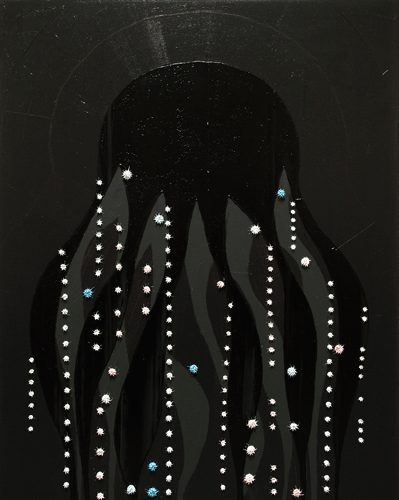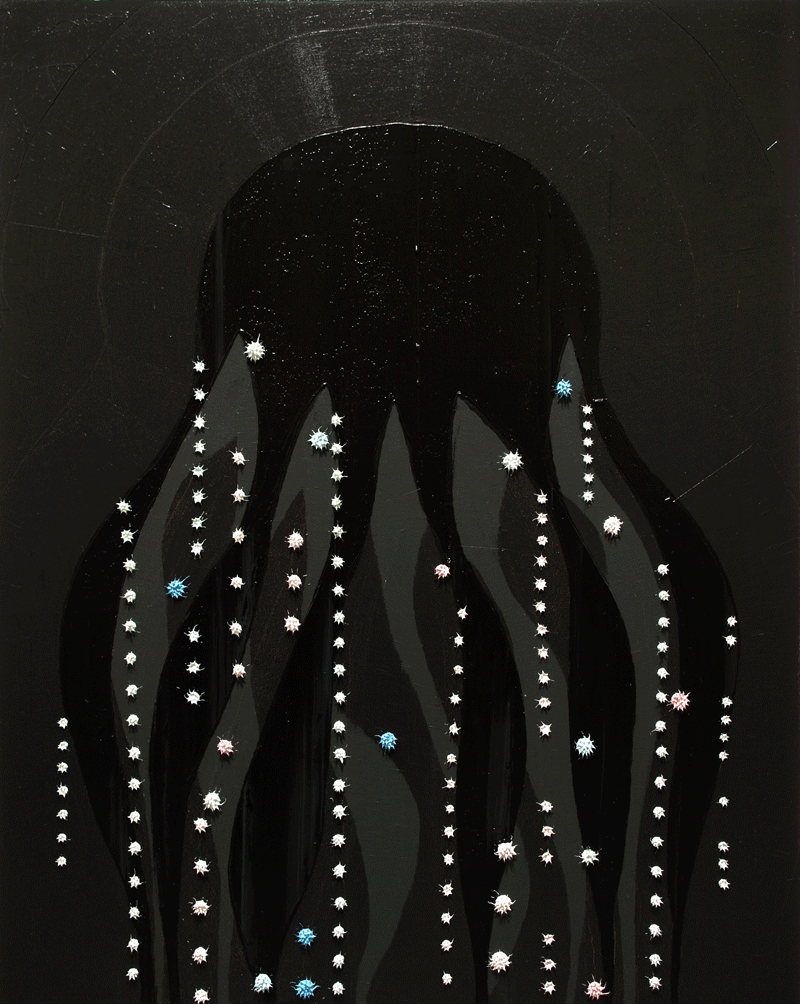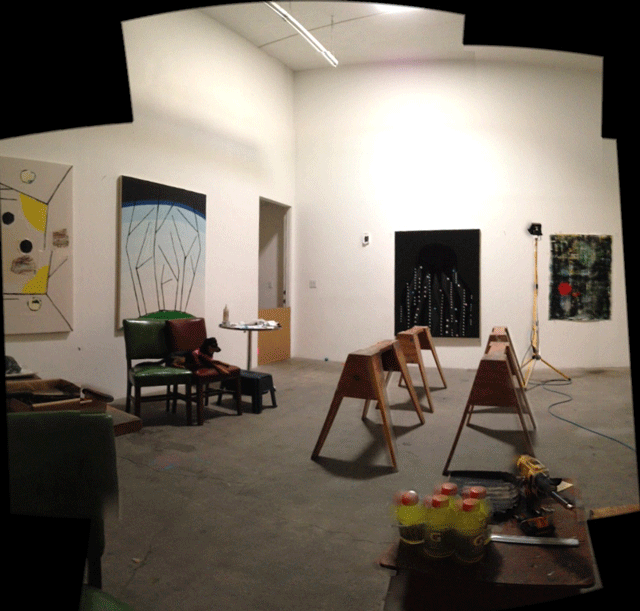May 28, 2012
mnemonic
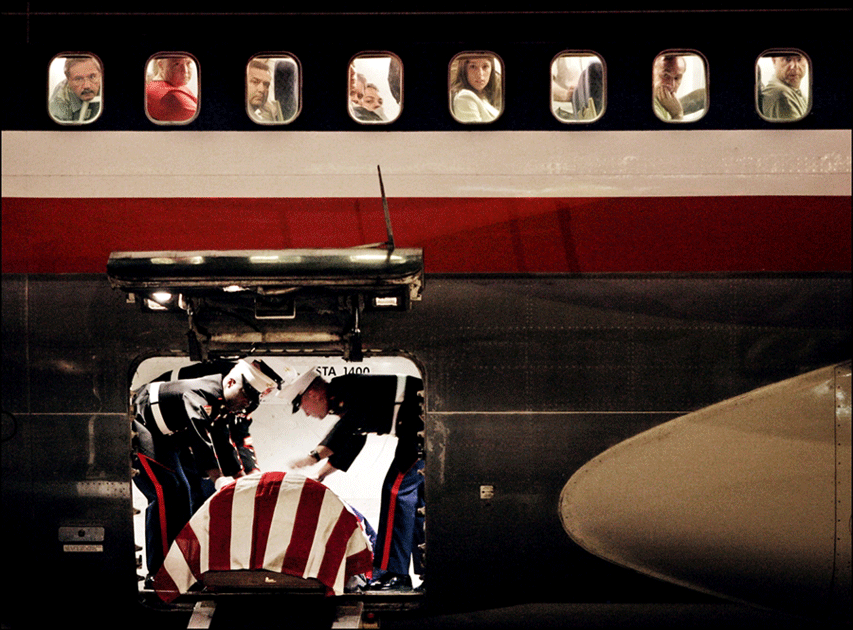
Todd Heisler/The Rocky Mountain News, via Associated PressSecond Lt. James Cathey?s body arrived at the Reno Airport in 2005.
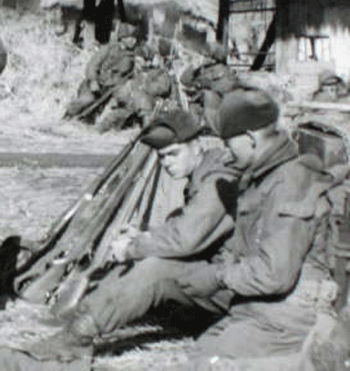
"It is foolish and wrong to mourn the men who died. Rather, we should thank God that such men lived." -Patton
May 24, 2012
Economics
How many of us have had to have a crash course in economics in the wake of 2008? I've learned a hell of a lot, but I have the autodidact's insecurity about sufficient knowledge. Here are three items that might illuminate things for us. I've noted Aleix Sal? before in the blog, good stuff.
Decoder ring:
Administraciones p?blicas = Government
Cajas de Ahorros = Savings and Loans
Inmobiliarias y Construcoras = the building industry (real estate and builders)
Hernando de Soto, an interview at Truman Factor:
Look, perhaps the following illustrates everything a little better: when in the year 2008 the financial crisis became evident, Mr. Henry Paulson, who was then U.S. Treasury Secretary, went to the US Congress and said: ?Look, we have found that there is this private money, which seems to represent assets that we do not know what they are, or who really owns them, we?ll call them troubled assets? Well, let?s do the following, we will go to banks, we?re going to ask which assets these are and we?ll buy them.? And he asks the US Congress to authorize an emergency budget of nearly a trillion dollars. And so the TARP (Troubled Asset Relief Program) comes into operation. Three weeks later, this same Mr. Paulson appears before TV and says, ?Well, look, let?s use this money but differently. What we?ll do is use it to purchase preferred shares of banks and, thus, show the public that no bank is really weak and that if they were, there?s the United States government to support them ?we will not allow a bankruptcy.? Naturally, a financial panic was avoided.If the next sentence causes you to palm your revolver, then please by all means, read the whole thing.
But the basic question that I made then was, why did he not stick to the original plan (buy the the assets or instruments that were failing)? And after talking to US Treasury officials and other contacts in the White House I found out the answer: the trouble assets were not found. In other words, none of this private liquidity had been recorded, no one really knows who owns what debt, many of them are failed, and nobody knows which are they. The problem now, both in Greece and in the United States, is that by rescuing financial institutions or countries (in the case of Greece, it will become insolvent soon) we cannot identify how big the debt is or who actually owns it.Then the big problem we have in the West is essentially an epistemological problem that results in a question of knowledge, the complete ignorance of the many problems we are facing. Hence, the great insecurity. And what is happening is that states are not addressing this problem because, until now, they do not know how to do it without causing panic. Because if we do an initial inventory to find out how many big banks have these troubled assets and how much of it they have, the figure could be so negative that it would takes us to 1930. So they have not found a strategy to sincere the economy and, at the same time, avoid a panic; therefore the patches: they are hoping to go from patch to patch so that in some miraculous way things will get solved, or so they say that John Maynard Keynes said seventy years ago.
Apparently, the standard model of physics and the economy illuminate one another. In the light of Simiocracia, the current/force/economy is either false or lower than the system configured.
Added: It's time to study the recent Argentine economic crisis.
May 21, 2012
Revolver: Miguel and Mirentxu visit LA
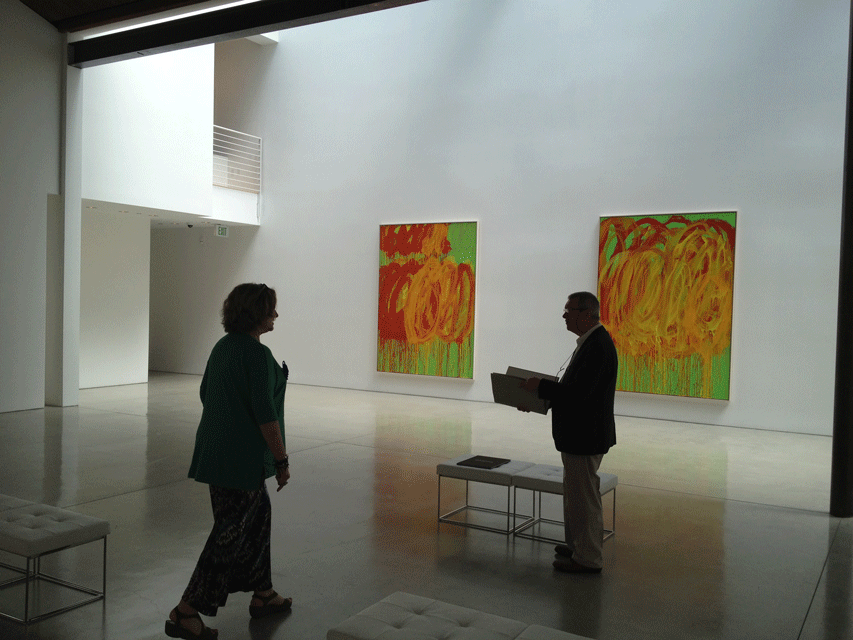
Miguel Marcos (Galeria Miguel Marcos, Barcelona) and Mirentxu Luisa C. Corcoy Bidasolo visit Los Angeles on their cross county 4 city tour of the United States in the spring of 2012.
May 18, 2012
The Dog, monoprints at Cirrus

Untitled #1
2012
Silkscreen and lithography monoprint, inkjet collage
48 x 35 1/2 inches
Images of the edition are here.
Cirrus Gallery
542 S. Alameda St.
Los Angeles, CA 90013
Tuesday-Saturday 10am- 5pm
(213) 680-3473
www.cirrusgallery.com
The Dog
Goya painted The Dog at the end of his life as he took refuge in a villa near Madrid. After initially painting the walls with conventionally inspiring images, he overpainted them with what we know today as his Black Paintings. I mark the beginning of my career in art with a visit to the Prado when I was a young teenager, and because of this, Goya's work has been my touchstone.
With this fourth monoprint project at Cirrus, I wanted to find a new way (at least for myself) to reveal the liquid world of ink and the peculiar physical dynamics of the print medium. I settled on conjuring fields of fractal pattern derived from the peel of paint between pliable sheets, the result of which was delivered to the bed of the press.
Multiple passes floated color over color and soon, the atmosphere of The Dog began to bloom on the paper. The corollary of the turbulence of Peninsular War of Goya's time to our own global problems today is made with caution. But the train of events that sprung from the American and French Revolution and had since rampaged throughout Europe is an integral part of the movement of modernity that has accelerated through the centuries, the ripples and echoes criss cross the world to this day for generations to come. Change brings uncertainty and dread and for this I drew the dark veil of Goya's Black Paintings down across the colorful lithographic inks with a black silkscreen whose fractal pattern is the same as that below.
The Dog is as simple as a figure in a field. The creature is a figure of fragile hope. The figure in these monoprints are ink jet avatars culled from the language of facture which has become typical to my painting practice. These spiny hemispheres of paint, resembling sea urchins, I call them monads, a name inspired by Gottfried Leibniz. They are, for this project, my dogs.
-Dennis Hollingsworth, 2012, Los Angeles
Minimalism at Michael Kohn Gallery
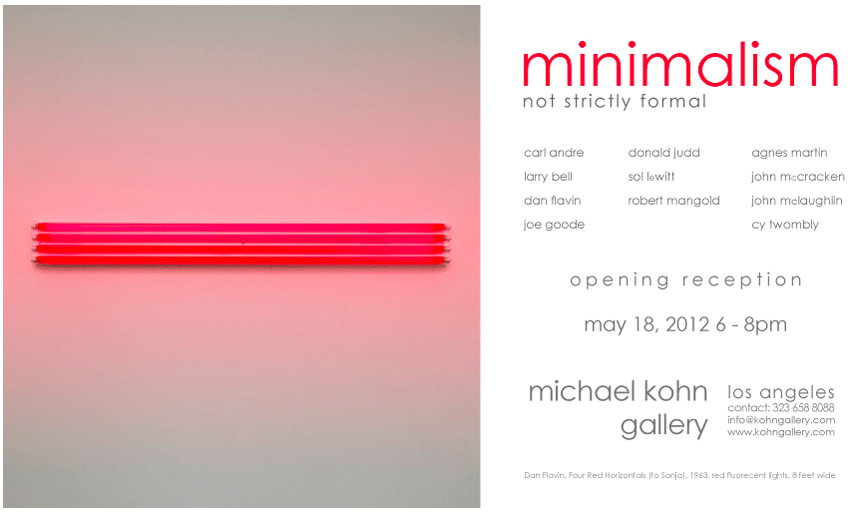
I saw some of the work at the install. Historical, great stuff, some well known, others obscure and all the more interesting for it.
Extents
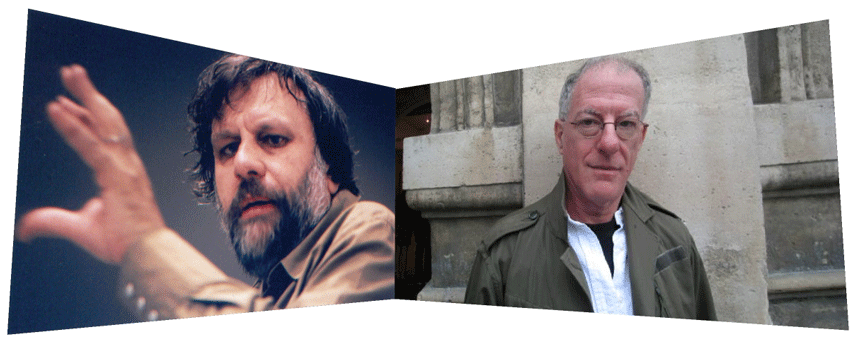
Extents, the political left. ?i?ek and Paul Berman.
In this post, I juxtapose two philosophers of our time, one that endorses revolutionary violence and an other who abhors the willingness to cross a line and coerce those who disagree with violent direct action in order to "accelerate history". My sympathies lie with the latter.
I've heard ?i?ek's name dropped in conversations with fellow artists several times recently. Since I had only a murky idea of his ideas, some research was in order. I jumped down a rabbit hole and collected a few links and videos to mark my trail.
This is the ?i?ek video that got me started here.
The point of every radical movement is terror. At 6:16, suicide is beautiful.
Robespierre:
Now what is the fundamental principle of democratic, or popular government, that is to say, the essential mainspring upon which it depends and which makes it function? It is virtue. I mean public virtue.?
That virtue is nothing else but love of fatherland and its laws.
...
The splendor of the goal of the French Revolution is simultaneously the source of our strength and of our weakness: our strength, because it gives us an ascendancy of truth over falsehood, and of public rights over private interests; our weakness, because it rallies against us all vicious men, all those who in their hearts seek to despoil the people.
...
It is necessary to stifle the domestic and foreign enemies of the Republic or perish with them. Now in these circumstances, the first maxim of our politics ought to be to lead the people by means of reason and the enemies of the people by terror.
If the basis of popular government in time of peace is virtue, the basis of popular government in time of revolution is both virtue and terror. Virtue without which terror is murderous, terror without which virtue is powerless.
Terror is nothing else than swift, severe, indomitable justice; it flows, then, from virtue.
Time= 0:27 "This is what terror is all about, to be frightened into conformity.
Time: 0.30:15 He had no concept of a loyal opposition.
Time = 0:45:42 this, the revolutionary dilemma, the calculated violent act to speed human history on its way... the republic consists of the complete extermination of all that opposes it
This is the full context from which the first ?i?ek video above was derived.
The option to use terror over persuasion chills my blood. Fellow art world friends, please tell me: why is ?i?ek interesting to us? Someone so glib as to endorse terror and not be serious about this should be classed as a frivolous mind. Someone so bold as to tell you to your face that they are willing to kill you if you don't agree with them... what is the best response to that situation?
The Jacobins triumphed against the sovereign monarchy and attempted to restart humanity ex-nihilo. But they ended up ostentatiously abstracting the citizenry towards the extreme, inadvertently investing such an plural abstraction with the powers of a monarch: the power to kill at a whim. Summary execution. Robespierre correlated the ratio of truth/falsehood with public rights/private interests and this is the root of this awful problem. The orgy of idealization ended up investing the gauzy agency of "public rights" with the characteristics of sovereign power, where instead they should have diffused the sovereignty of kings into the general population such that every person would be considered a sovereign individual, a diminution of royalty and a simultaneous elevation of everyman.
One thing leads to another. I discovered Simon Schama in the video. He discusses his book "Citizens" on C-Span's BookNotes:
Snips:
LAMB:...Do you consider yourself a political conservative?Emphasis mine.
SCHAMA: No. Not at all. I know, it comes as a big surprise. I don't however think that because I am not a political conservative, I'm one of that vanishing breed -- an unrepentant liberal. To dare to say that revolutions on the whole have been a bad, with the exception of the American Revolution, which did indeed work out absolutely to create a new pluralist democracy. But the line of revolution from France to Russia to China has really not made the world a happier place. I think it's absolutely essential for the self-respect of liberals to actually stare that issue in the face and not to say, "Oh, my goodness, if we feel a little bleak about the French Revolution, we're betraying liberalism." I think is sort of preposterous piece of self-delusion. So I'm sort of rather maverick liberal, I suppose, sort of unpredictable in that way.
The fundamental issue is this: Did the actual experience of the French Revolution realize, fulfill, or did it damage what was set out in the Declaration of the Rights of Man and Citizen? Did it actually fulfill the promise of freedom" freedom of press, freedom of person, due process under the law, or did it actually violate those things? Nobody disagrees as far as I know except people on the extreme right and extreme left that what was said in the Declaration of the Rights of Man, as in our Bill of Rights and the Bill of Rights of Virginia of 1776, nobody disputes the splendor of what was said. The issue is whether revolutionary politics, this kind of politics of ecstasy and fear, was more likely to secure those freedoms or not. The people who want to argue with me say, "Take the Revolution warts and all. It may have had its excesses, it may have had its bloodshed, but it fundamentally brought a true democratic freedom into the world." My view is that it doesn't do that. It actually seriously damages the freedoms it's supposed to sustain, and that is a really clear division.
LAMB: Who wrote the Declaration of the Rights of Man?
SCHAMA: It was by many hands, actually. The first suggestion is Jefferson's, actually, as far as I know. In June it's promulgated on August 2 ...
LAMB: 1789.
SCHAMA: It's promulgated by the National Assembly. It's published on August the 26th. What happens between June and August is the story of its transformation. Jefferson proposed, I think thinking of the Virginia Bill of Rights in particular, he said, "Look, there's a way out, what seemed to be this impasse between the king and the National Assembly." He said, "Why doesn't the king come out with this wonderful Declaration of the Rights" -- He was saying it to Lafayette, by the way, who was then in the National Assembly. What a good idea. The king was not in the declaration business at that stage, but then Lafayette gets to work, and Lafayette produces his version of the Declaration of Rights on July 11, three days before the Bastille falls. It's sort of very loose and really very interesting document. But after the Bastille has fallen, after there's blood in the streets of Paris, the climate is changed and instead of a Declaration of Rights being kind of an instrument of conciliation, it's conceived by the majority in the National Assembly as a way to lock the king into a kind of constitutional position, to make him unthreatening.So what is kind of ominous about the final version of the Declaration of the Rights, which, as I say, is by many, many hands, it's difficult, really, to sort out individual responsibility. If there was one person, he would be called, I suppose, who's so important was a man called the Abb's. He was a retired ex-priest, very clever, brilliant but rather icy intellect. He had written a pamphlet at the end of 1788 called "What Is the Third Estate?" which was the most radical and really brilliantly written of all the documents of the time. It begins, "What is the Third Estate? What has it been? Nothing? What is it? Everything. What does it seek to be? Something." It was a wonderful rhetorical beginning. He was very brilliant.
The view at the time of the Declaration was that all power resides in the nation. It should all be very concentrated in the nation and there should be no division between its parts. That was really the view that prevailed. If you look at the articles of the Declaration of the Rights of Man and Citizen, it's very interesting because they're going in the opposite direction to the Bill of Rights in the United States. The Bill of Rights is designed as an amendment to protect absolutely individual freedoms. The articles of the Rights of Man, for example, the one which talks about freedom of press and freedom of expression says these freedoms are guaranteed sacred, providing they are not abused. It left it to future governments and a future penal code to determine what constituted abuse.
Freedom from arbitrary arrest, guaranteed due process under the law -- go on to the next line; it says, However, when a citizen is summoned before a tribunal, to resist or object constitutes itself a crime. So there are a lot of very heavy reservations in the eventual document.
***
Paul Berman
I've written about Paul Berman's work here before (link, for example). I snip from Wikipedia: "In Terror and Liberalism, Berman offers a theory of totalitarianism. In his interpretation, totalitarian movements of the right and the left arose in Europe in the aftermath of the First World War as a reaction to the successes and failures of liberal civilization. The ideologies promoted mythologies of world events that were paranoid, apocalyptic, utopian, obsessed with purity, and ultimately nihilist. The totalitarian movements were, in Berman?s account, mass mobilizations for unattainable aims."
Berman's position on the lnature and limits of protest is outlined here:Why I Support Occupy Wall Street. He's the polar opposite of ?i?ek, a person who is comfortable that the dialectic of democracy will wind its way to progress in its own time.
***
UPDATE: Pentti Linkola
I wonder what ?i?ek thinks about his ideas?
"A minority can never have any other effective means to influence the course of matters but through the use of violence.""Any dictatorship would be better than modern democracy. There cannot be so incompetent dictator, that he would show more stupidity than a majority of the people. Best dictatorship would be one where lots of heads would roll and government would prevent any economical growth."
"That there are billions of people over 60kg weight on this planet is recklessness."
"Alternative movements and groups are a welcome relief and a present for the society of economic growth."
"We will have to...learn from the history of revolutionary movements ? the national socialists, the Finnish Stalinists, from the many stages of the Russian revolution, from the methods of the Red Brigades ? and forget our narcissistic selves."
"Everything we have developed over the last 100 years should be destroyed."
"A fundamental, devastating error is to set up a political system based on desire. Society and life are been organized on basis of what an individual wants, not on what is good for him or her...Just as only one out of 100,000 has the talent to be an engineer or an acrobat, only a few are those truly capable of managing the matters of a nation or mankind as a whole...In this time and this part of the World we are headlessly hanging on democracy and parliamentary system, even though these are the most mindless and desperate experiments of the mankind...In democratic coutries the destruction of nature and sum of ecological disasters has accumulated most...Our only hope lies in strong central government and uncompromizing control of the individual citizen."
***
UPDATE 2:
THE OLD CORDELIER
BY CAMILLE DESMOULINS
Issue 3
Live free or die
Quintidi frimaire, 3rd decadi, year II of the Republic, one and indivisible
?Crime of counter-revolution: for Libon Drusus to have asked the fortune-tellers if he would one day possess great riches. Crime of counter-revolution: for journalist Cremutius Cordus to have called Brutus and Cassius the last of the Romans. Crime of counter-revolution: for one of the descendants of Cassius to have in his house a portrait of his ancestor. Crime of counter-revolution: for Mamercus Scaurus to have written a tragedy with a verse which could be given two meanings. Crime of counter-revolution: for Torquatus Silanus?s spending. Crime of counter-revolution: for Petreius to have had a dream about Claudius. Crime of counter-revolution: against Appius Silanus, as Cladius?s wife had a dream about him. Crime of counter-revolution: against Pomponius, because a friend of Sejanus sought refuge in one of his country houses. Crime of counter-revolution: to have gone to the cloakroom without emptying the pockets, and to keep in the jacket a royal-sided coin; this was a lack of respect to the sacred figure of tyrants. Crime of counter-revolution: to complain of hard times as this was to attack the government. Crime of counter-revolution: not to invoke the divine genius of Caligula. For having neglected these, a great number of citizens were torn apart, condemned to the mines or to the beasts, even having the middle of their bodies sawn through. Crime of counter-revolution: for the mother of the consul Fusius Geminus to have cried at the death of her son.
?It was necessary to show joy at the death of a friend, a parent, in order not to risk exposing oneself death. Under Nero, those close to many whom he had had killed went to give thanks to the gods: they were enlightened. At the very least it was necessary to seem contented, open and calm. People feared that fear itself made one guilty.
?And all offends the tyrant. Was a citizen popular? then a rival of the prince, who could stir up civil war. Studia civium in se verteret et si multi idem audeant, bellum esse. Suspect.
?Were you, conversely, against popularity? And did you keep yourself by your fireside? This withdrawn life made you singled out, made you noticed. Quant? metu occultior, tant? fam? adeptus. Suspect.
?Were you rich? There was a serious danger that the people would be corrupted by your generosity. Auri vim atque opes Plauti principi infensas. Suspect.
?Were you poor? how so? great emperor, you must watch those men more closely. There is no-one more enterprising that he who has nothing.Syllam inopem, und? pracipuam audaciam. Suspect.
?Had you a solemn nature, given to melancholy or neglect? your affliction must be that public affairs were going well.Hominum bonis publicis maestum. Suspect.
May 12, 2012
Oedipus Sandwich: Paul McCarthy
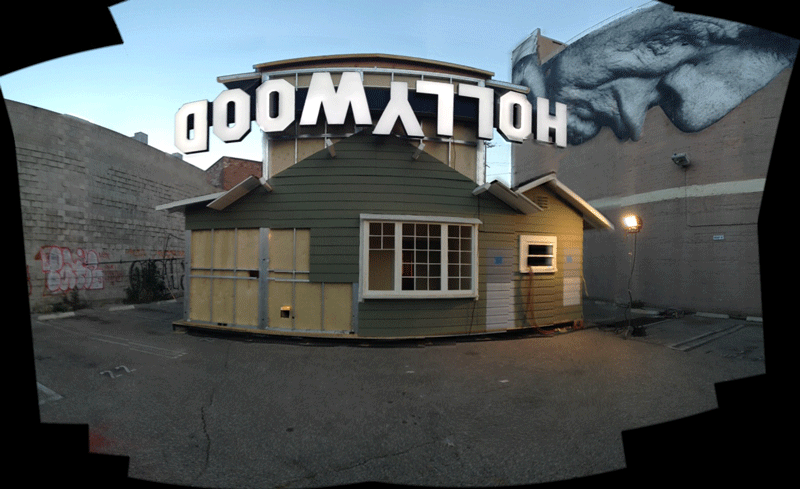
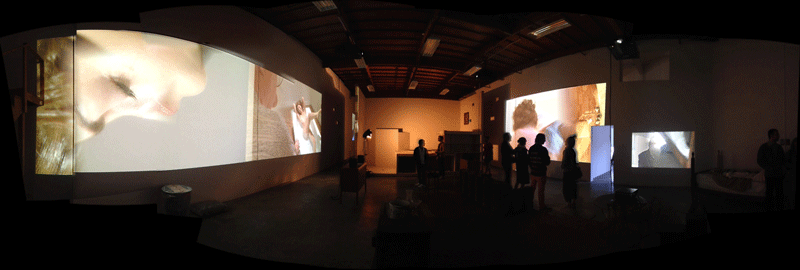
Oedipus is still killing his father, it seems.
Given that this installation premiered here before it travels to Hauser & Wirth in NYC, given that McCarthy is probably the one of the best artist generated in Los Angeles, I think that the McCarthy show at The Box is probably the greatest private exhibition in the art history of LA (excluding institutional shows such as Schimmel's Helter Skelter).
Upon seeing the videos of McCarthy as the bad daddy inside the gallery, the thought of Sophocles crept in. This morning, I again watched videos of the Gospel at Colonus by lee Breuer and Bob Telson, created in 1985. Sophocles' third act of his Theban Plays is a consummation of the tragic, the nature of which never lent it much leverage with the modern stage since the play was about reconciliation, a limp driver for drama. This was the genius of the Gospel at Colonus: the marriage of black Pentecostal gospel and ancient Greek tragedy, one reinforced the other. I wonder though, does McCarthy have a Colonus -a third act- in him?
May 8, 2012
Sean Cassidy

I went to UC Irvine to visit Sean Cassidy's studio. A longtime Chinatown artist, he decided to jump into the bootcamp of art grad school. He didn't have to, but he will be better for it.
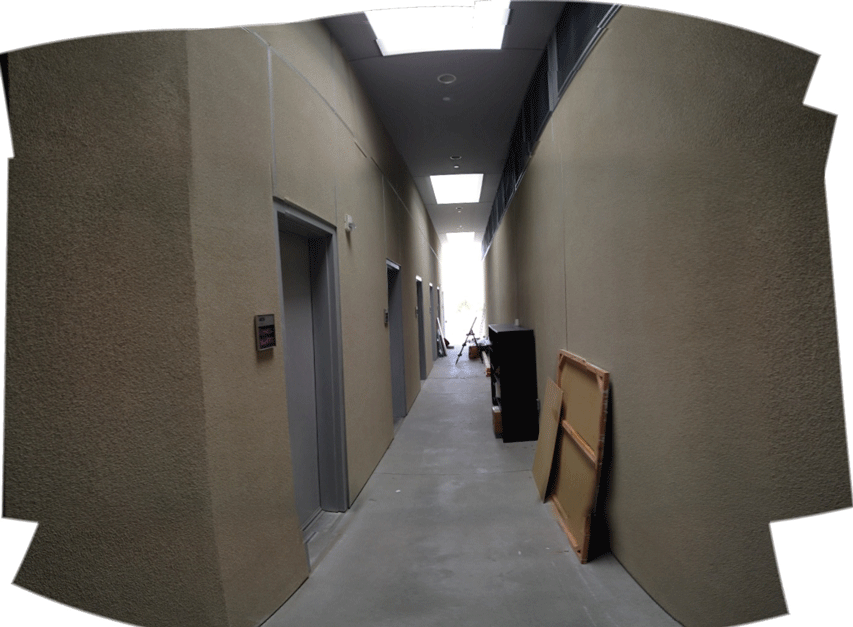
The students get tight quarters, cells of 8'x16' each. But this image doesn't tell the whole story, they've got an abundance of shops and ample working space too. The faculty has a good profile, sharp enough. A recent visiting artist was Robert Irwin. A good school.
Check it out, Sean built a colonnade in his studio.
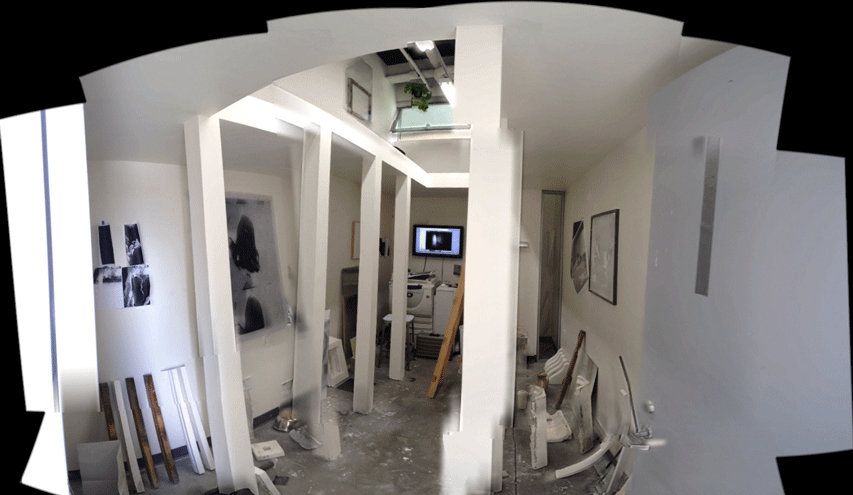
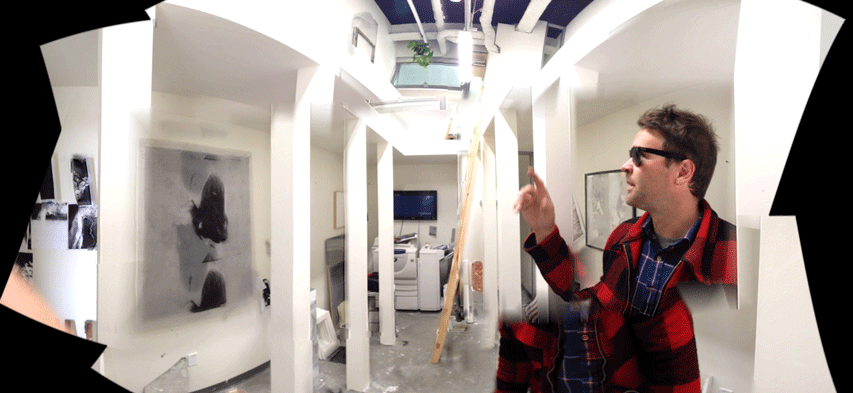
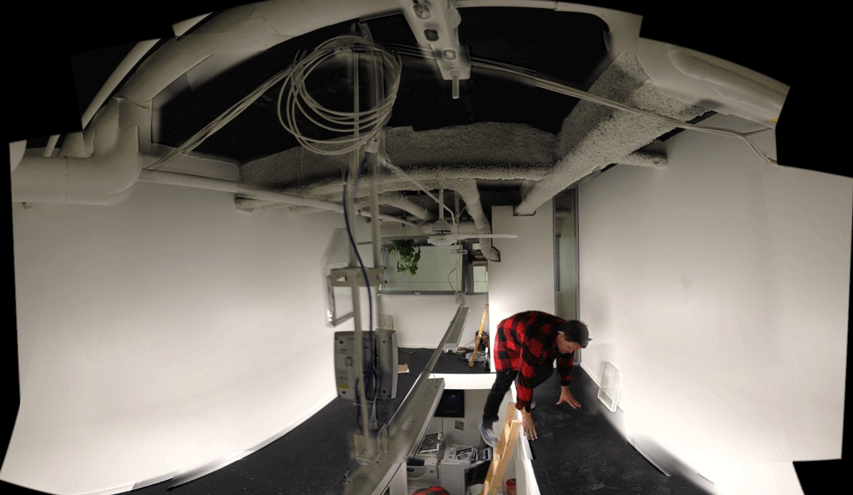
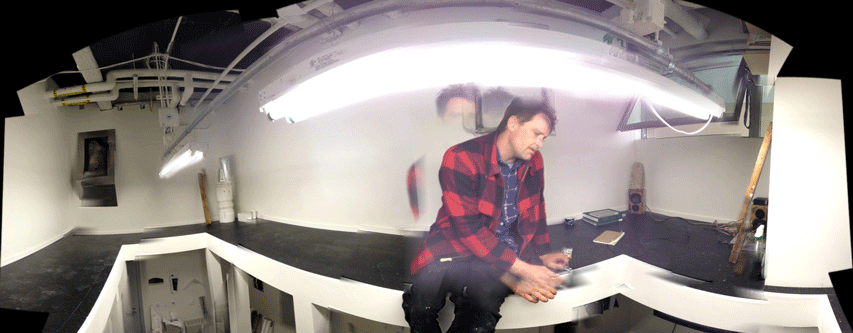
May 5, 2012
R.I.P. Nathanial Hornblower:
Ch-Check It Out by Mic-to-Mic
Ch-check out 2004.
May 4, 2012
Revolver: LA
A few notes:
Michel Auder by Palaisdetokyo
1. This is one of the Auder videos in the show at Kayne Griffin Corcoran Gallery.
2. The last paintings of Cy Twombly prompted a comparison to De Kooning's last work... not to Twombly's advantage, I would say.
3. Guy de Cointet's Five Sisters, an artwork made at the end his life. I learned that he had an ambition to work in theater and the lack of artwork as stageprop seems to indicate that this is true. Watching it, I was reminded of Joyce, with acting and dialog that conjured the figure of Annie Livia Plurabelle for me.
